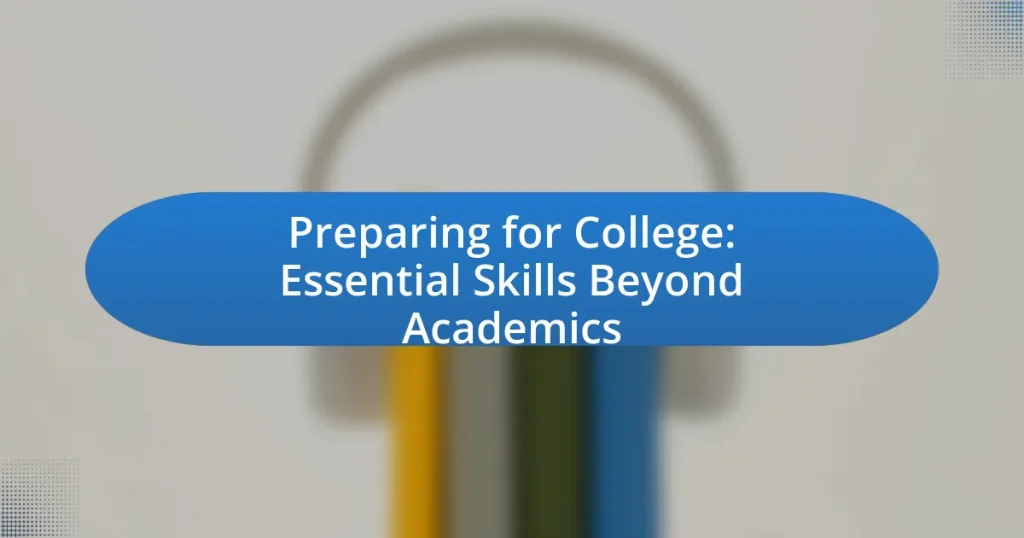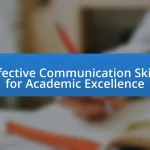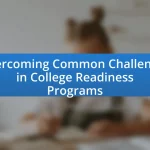The article “Preparing for College: Essential Skills Beyond Academics” focuses on the critical skills necessary for successful college preparation, emphasizing both academic and non-academic competencies. Key skills discussed include time management, effective communication, critical thinking, self-discipline, teamwork, and problem-solving, all of which significantly impact academic performance and overall college readiness. The article highlights the importance of developing these skills through practical experiences, such as part-time jobs and collaborative learning, and underscores their relevance in fostering resilience, adaptability, and interpersonal relationships essential for navigating college life. Additionally, it addresses the role of financial literacy and the benefits of utilizing campus resources to support students’ academic and personal growth.
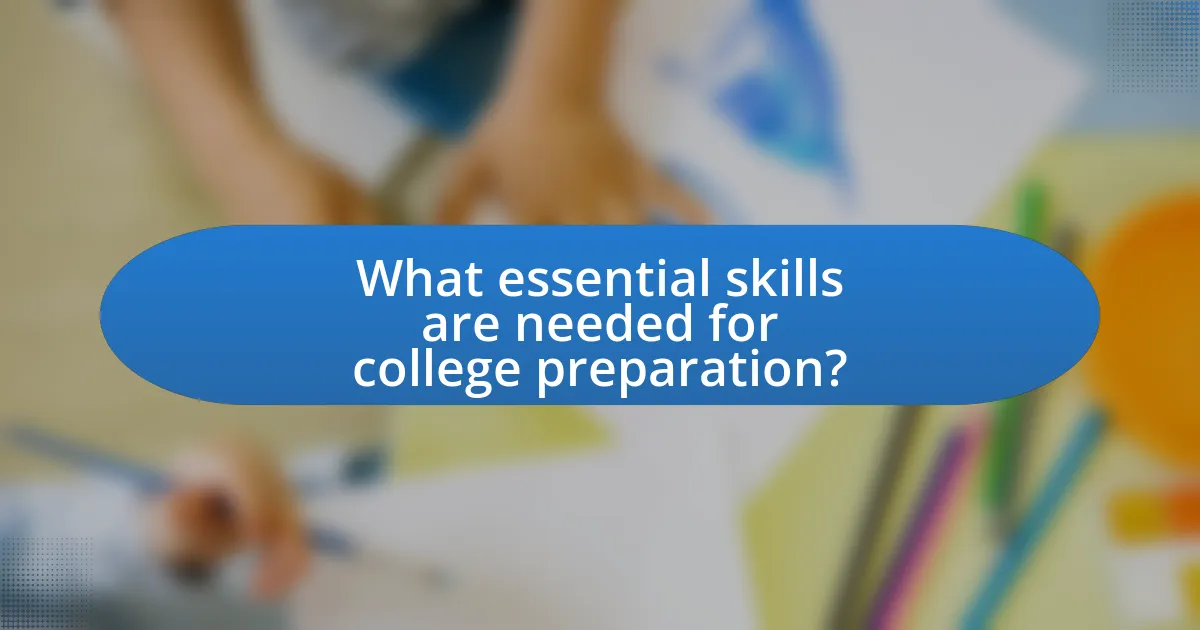
What essential skills are needed for college preparation?
Essential skills needed for college preparation include time management, effective communication, critical thinking, and self-discipline. Time management enables students to balance academic responsibilities with extracurricular activities, which is crucial for success in a college environment. Effective communication skills, both written and verbal, are necessary for collaborating with peers and engaging with professors. Critical thinking allows students to analyze information and solve problems, a key component of college coursework. Self-discipline is vital for maintaining motivation and focus, especially in a less structured college setting. Research indicates that students who develop these skills are more likely to succeed academically and adapt to the challenges of higher education.
How do non-academic skills impact college success?
Non-academic skills significantly impact college success by enhancing students’ ability to navigate the academic environment and manage personal challenges. Skills such as time management, communication, and emotional intelligence contribute to better academic performance and overall well-being. For instance, a study published in the Journal of Educational Psychology found that students with strong time management skills achieved higher GPAs compared to their peers. Additionally, effective communication skills facilitate collaboration and networking, which are crucial for academic and career opportunities. Emotional intelligence helps students cope with stress and build resilience, further supporting their academic journey.
What are the key non-academic skills students should develop?
Key non-academic skills students should develop include communication, teamwork, problem-solving, time management, and adaptability. Communication skills enable students to express ideas clearly and effectively, which is crucial in both academic and professional settings. Teamwork fosters collaboration, allowing students to work well with others towards common goals. Problem-solving skills help students navigate challenges and find effective solutions, a vital ability in any field. Time management is essential for balancing academic responsibilities with personal commitments, ensuring productivity and reducing stress. Lastly, adaptability prepares students to adjust to new situations and challenges, a necessary trait in an ever-changing world. These skills are increasingly recognized by employers as critical for success in the workplace, as evidenced by surveys indicating that 93% of employers prioritize soft skills in hiring decisions.
How do these skills contribute to overall college readiness?
Essential skills such as time management, critical thinking, and effective communication significantly contribute to overall college readiness. These skills enable students to balance academic responsibilities, analyze complex information, and articulate ideas clearly, which are crucial for success in a college environment. For instance, research from the National Center for Education Statistics indicates that students who possess strong time management skills are more likely to meet deadlines and achieve higher grades, demonstrating the direct impact of these skills on academic performance. Additionally, effective communication skills are essential for collaboration in group projects and presentations, which are common in college courses. Thus, mastering these essential skills prepares students not only for academic challenges but also for the collaborative and independent nature of college life.
Why is time management crucial for college students?
Time management is crucial for college students because it directly impacts their academic performance and overall well-being. Effective time management allows students to prioritize tasks, meet deadlines, and balance academic responsibilities with personal commitments. Research indicates that students who practice good time management skills tend to achieve higher grades and experience lower stress levels. For instance, a study published in the Journal of Educational Psychology found that students who utilized time management strategies reported a 20% increase in academic performance compared to those who did not. This demonstrates that mastering time management is essential for success in the college environment.
What techniques can help improve time management skills?
Techniques that can help improve time management skills include prioritization, the Pomodoro Technique, and setting SMART goals. Prioritization involves identifying tasks based on their urgency and importance, allowing individuals to focus on what truly matters. The Pomodoro Technique encourages working in focused intervals of 25 minutes followed by short breaks, which enhances concentration and reduces burnout. Setting SMART goals—Specific, Measurable, Achievable, Relevant, and Time-bound—provides a clear framework for what needs to be accomplished, making it easier to track progress and stay motivated. These techniques are supported by research indicating that structured approaches to time management lead to increased productivity and reduced stress levels among students.
How does effective time management affect academic performance?
Effective time management significantly enhances academic performance by allowing students to allocate sufficient time for studying, completing assignments, and preparing for exams. Research indicates that students who practice effective time management techniques, such as prioritizing tasks and setting specific goals, tend to achieve higher grades and exhibit lower levels of stress. A study published in the Journal of Educational Psychology found that students who utilized time management strategies scored, on average, 20% higher on assessments compared to those who did not. This correlation underscores the importance of time management as a critical skill for academic success.
What role does communication play in college life?
Communication plays a crucial role in college life by facilitating academic success, social interactions, and personal development. Effective communication skills enable students to engage in discussions, collaborate on group projects, and seek help from professors, which enhances their learning experience. Research indicates that students with strong communication abilities are more likely to participate in class and form meaningful relationships, contributing to a supportive academic environment. Furthermore, studies show that effective communication is linked to higher levels of student satisfaction and retention rates, underscoring its importance in navigating the complexities of college life.
How can students enhance their verbal and written communication skills?
Students can enhance their verbal and written communication skills by actively engaging in practice and seeking feedback. Regular participation in discussions, presentations, and writing exercises helps to refine these skills. Research indicates that students who engage in peer review and collaborative projects show significant improvement in their communication abilities, as they learn to articulate their thoughts clearly and receive constructive criticism. Additionally, utilizing resources such as writing centers and public speaking workshops can provide targeted support, further enhancing their proficiency in both verbal and written forms.
Why is networking important during college?
Networking is important during college because it facilitates connections that can lead to internships, job opportunities, and professional growth. Establishing relationships with peers, professors, and industry professionals enhances access to resources and information that are crucial for career advancement. According to a survey by the National Association of Colleges and Employers, 85% of jobs are filled through networking, highlighting its significance in the job market. Additionally, networking helps students develop essential soft skills, such as communication and teamwork, which are highly valued by employers.
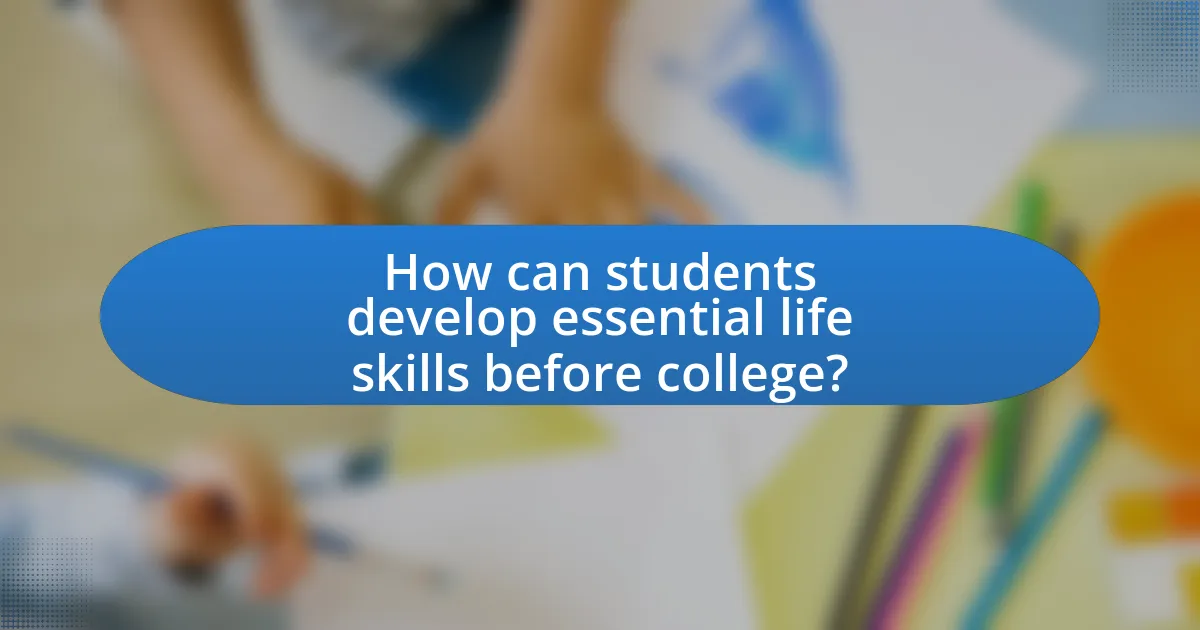
How can students develop essential life skills before college?
Students can develop essential life skills before college by engaging in practical experiences that foster independence and responsibility. Participating in part-time jobs or internships helps students learn time management, teamwork, and financial literacy. Research indicates that 70% of employers value practical experience over academic credentials, highlighting the importance of real-world skills. Additionally, volunteering in community service enhances communication and problem-solving abilities, which are crucial for personal and professional success. By actively seeking these opportunities, students can build a strong foundation of life skills that will benefit them in college and beyond.
What are the best practices for building financial literacy?
The best practices for building financial literacy include educating oneself on budgeting, saving, investing, and understanding credit. Engaging in practical exercises, such as creating a personal budget or using financial management apps, reinforces these concepts. Research indicates that individuals who participate in financial education programs are more likely to demonstrate improved financial behaviors, such as increased savings rates and better credit scores. For instance, a study by the National Endowment for Financial Education found that participants in financial literacy programs showed a 20% increase in their savings habits.
How can budgeting skills benefit students in college?
Budgeting skills benefit students in college by enabling them to manage their finances effectively, which is crucial for academic success and personal well-being. Effective budgeting helps students allocate funds for tuition, housing, food, and other essential expenses, reducing the risk of financial stress that can negatively impact their studies. According to a study by the National Endowment for Financial Education, students who engage in budgeting are more likely to avoid debt and achieve financial stability, which correlates with higher academic performance. Thus, mastering budgeting skills equips students with the tools to navigate their financial responsibilities, fostering a more focused and productive college experience.
What resources are available for learning about personal finance?
Resources available for learning about personal finance include books, online courses, podcasts, and financial literacy websites. Notable books such as “The Total Money Makeover” by Dave Ramsey and “Rich Dad Poor Dad” by Robert Kiyosaki provide foundational knowledge. Online platforms like Coursera and Khan Academy offer structured courses on budgeting, investing, and saving. Podcasts such as “The Dave Ramsey Show” and “BiggerPockets Money” deliver insights from financial experts. Websites like Investopedia and the National Endowment for Financial Education (NEFE) provide articles and tools for financial education. These resources collectively enhance understanding of personal finance, equipping individuals with essential skills for managing their finances effectively.
How can students improve their problem-solving abilities?
Students can improve their problem-solving abilities by engaging in critical thinking exercises and collaborative learning activities. Critical thinking exercises, such as puzzles and logic games, enhance analytical skills and encourage students to approach problems systematically. Collaborative learning, through group projects or discussions, allows students to share diverse perspectives and develop solutions collectively. Research indicates that students who participate in collaborative learning environments demonstrate higher problem-solving skills, as evidenced by a study published in the Journal of Educational Psychology, which found that cooperative learning significantly boosts students’ ability to tackle complex problems.
What strategies can be used to enhance critical thinking skills?
To enhance critical thinking skills, individuals can engage in reflective practice, which involves analyzing one’s own thought processes and decisions. This strategy encourages self-assessment and the identification of biases, leading to improved reasoning abilities. Research by the Foundation for Critical Thinking indicates that reflective practices, such as journaling and peer discussions, significantly boost critical thinking by fostering deeper understanding and evaluation of information. Additionally, participating in debates and problem-solving activities can further develop these skills by challenging individuals to consider multiple perspectives and construct well-reasoned arguments.
How does problem-solving relate to academic challenges in college?
Problem-solving is essential for overcoming academic challenges in college, as it enables students to analyze complex issues, develop strategies, and implement solutions effectively. In college, students frequently encounter multifaceted problems, such as managing time, understanding difficult concepts, and collaborating on group projects. Research indicates that strong problem-solving skills correlate with higher academic performance; for instance, a study published in the Journal of Educational Psychology found that students who engage in problem-based learning demonstrate improved critical thinking and academic outcomes. Thus, the ability to solve problems directly influences a student’s success in navigating the various academic challenges they face in college.
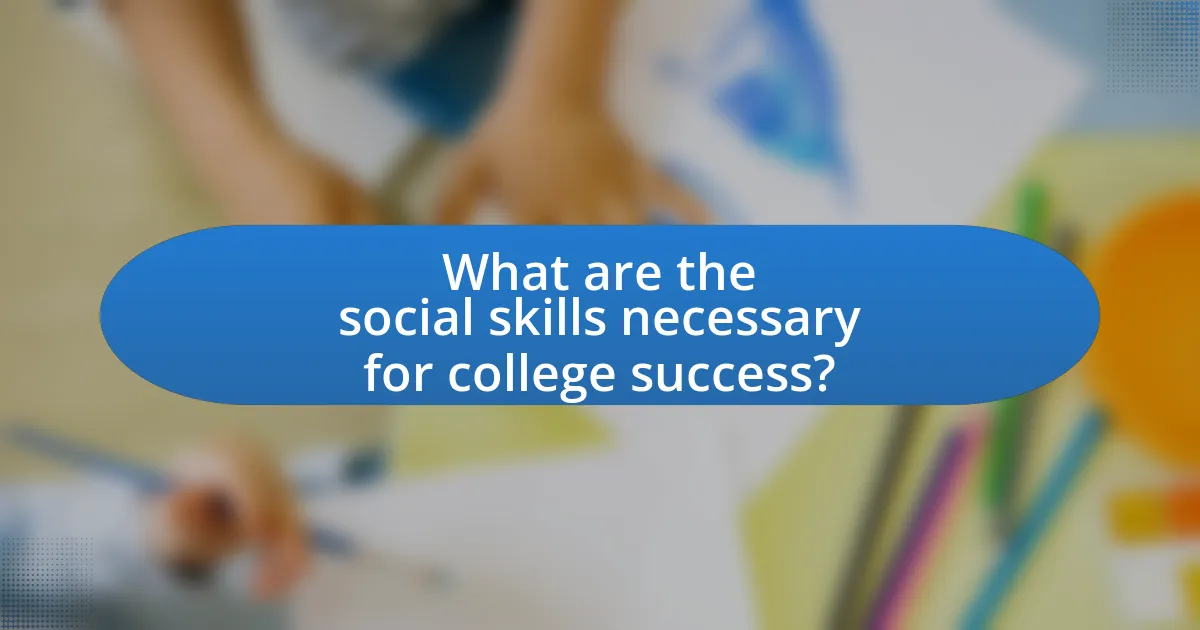
What are the social skills necessary for college success?
Effective communication, teamwork, and conflict resolution are essential social skills for college success. Effective communication enables students to express ideas clearly and engage in meaningful discussions, which is crucial for group projects and presentations. Teamwork fosters collaboration, allowing students to work effectively with diverse peers, enhancing their learning experience. Conflict resolution skills help students navigate disagreements constructively, promoting a positive academic environment. Research indicates that students with strong social skills are more likely to form supportive networks, leading to higher academic performance and overall college satisfaction.
How can students build strong interpersonal relationships?
Students can build strong interpersonal relationships by actively engaging in communication and collaboration with peers. Effective communication involves listening attentively, expressing thoughts clearly, and being open to feedback, which fosters trust and understanding. Collaboration in group projects or extracurricular activities allows students to work together towards common goals, enhancing their ability to connect with others. Research indicates that students who participate in team-based learning experiences report higher levels of satisfaction and stronger relationships with classmates, as noted in a study published in the Journal of Educational Psychology. This evidence supports the notion that interaction and teamwork are crucial for developing meaningful interpersonal connections.
What role does teamwork play in college environments?
Teamwork plays a crucial role in college environments by enhancing collaboration, communication, and problem-solving skills among students. In academic settings, students often engage in group projects, study sessions, and extracurricular activities that require them to work together towards common goals. Research indicates that students who participate in teamwork develop essential interpersonal skills, which are vital for their future careers. For instance, a study published in the Journal of Educational Psychology found that collaborative learning significantly improves students’ academic performance and social skills, demonstrating the effectiveness of teamwork in fostering a supportive learning atmosphere.
How can conflict resolution skills be developed?
Conflict resolution skills can be developed through practice, education, and self-reflection. Engaging in role-playing exercises, participating in workshops, and studying conflict resolution theories enhance understanding and application of these skills. Research indicates that individuals who actively participate in conflict resolution training demonstrate improved communication and negotiation abilities, leading to more effective conflict management in real-life situations. For instance, a study by the University of Notre Dame found that students who underwent conflict resolution training reported a 30% increase in their ability to resolve disputes amicably.
What strategies can help students adapt to college life?
Students can adapt to college life by developing effective time management skills. Time management allows students to balance academic responsibilities, social activities, and personal commitments, which is crucial for success in a college environment. Research indicates that students who utilize planners or digital calendars to organize their schedules report higher levels of academic performance and lower stress levels (Britton & Tesser, 1991). Additionally, engaging in campus activities and forming study groups can enhance social connections and provide academic support, further aiding the transition to college life.
How can resilience and adaptability be fostered in students?
Resilience and adaptability can be fostered in students through structured support systems and experiential learning opportunities. Implementing programs that encourage problem-solving, critical thinking, and emotional regulation helps students navigate challenges effectively. Research indicates that students who engage in collaborative projects and face real-world problems develop greater resilience, as they learn to adapt to changing circumstances and overcome obstacles. For instance, a study by the American Psychological Association found that students who participate in resilience training programs show improved coping skills and adaptability in academic settings.
What are the benefits of seeking support and resources on campus?
Seeking support and resources on campus enhances students’ academic success and personal well-being. Accessing these resources, such as tutoring centers, mental health services, and academic advising, provides students with tailored assistance that can improve their understanding of course material, reduce stress, and foster a sense of community. Research indicates that students who utilize campus resources are more likely to persist in their studies and achieve higher grades, as evidenced by a study from the National Center for Education Statistics, which found that students who engage with academic support services have a 10% higher retention rate compared to those who do not.
What practical tips can help students prepare for college beyond academics?
Students can prepare for college beyond academics by developing essential life skills such as time management, financial literacy, and effective communication. Time management is crucial; students should create schedules that balance study, work, and leisure, which can enhance productivity and reduce stress. Financial literacy is equally important; understanding budgeting, saving, and managing expenses can prevent financial difficulties in college. Effective communication skills, including writing and public speaking, are vital for academic success and networking opportunities. Research indicates that students who possess these skills are more likely to adapt successfully to college life and achieve their academic goals.
